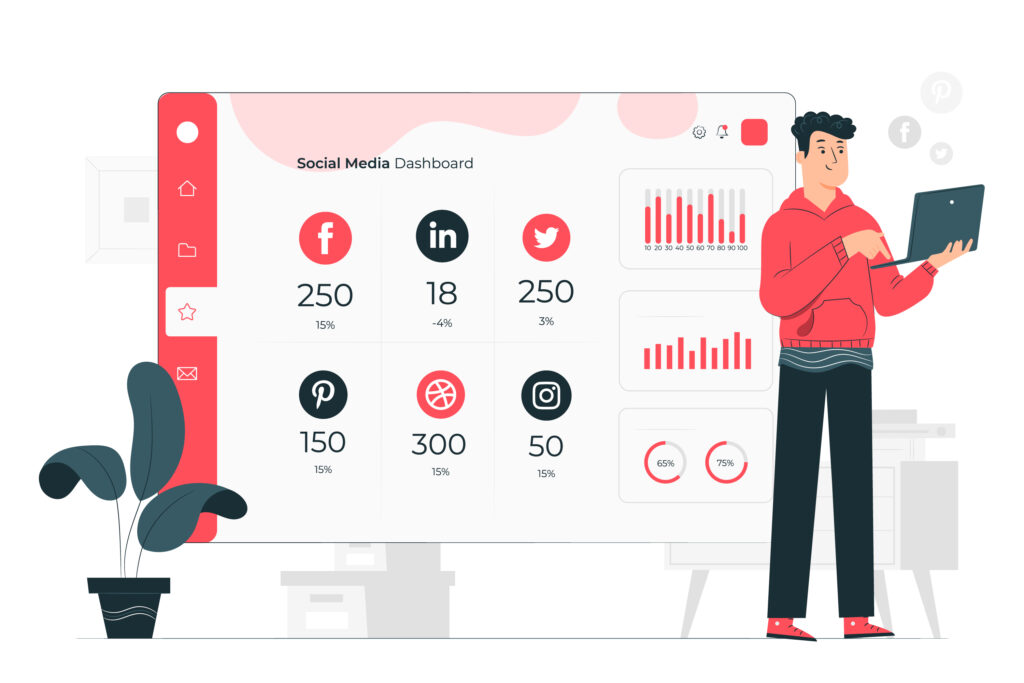
In today’s competitive business landscape, customer loyalty is more valuable than ever. Consumers have a vast array of choices at their fingertips, and building lasting relationships with them is key to sustainable growth.
Relationship marketing emerges as a powerful strategy for achieving this goal. It goes beyond one-time transactions, focusing on fostering long-term connections with customers through personalized interactions, exceptional service, and a commitment to understanding their needs.
This article delves into the core principles of relationship marketing, exploring its benefits, key strategies, and the role of technology in nurturing customer relationships. By understanding how to cultivate strong customer bonds, businesses can unlock a wealth of benefits, from increased customer lifetime value to positive word-of-mouth marketing.
Table of Contents
Key Takeaways
- Relationship marketing is about building strong connections with customers to foster loyalty and repeat business.
- The key benefits of relationship marketing include increased customer retention, higher customer lifetime value, and positive word-of-mouth referrals.
- To build and maintain long-term customer relationships, businesses should focus on personalized communication, delivering exceptional customer service, and being transparent and trustworthy.
- Technology plays a crucial role in nurturing customer relationships by enabling personalized interactions, efficient data management, and targeted marketing campaigns.
- Effective customer engagement strategies involve active listening, responding promptly to customer inquiries and feedback, and creating valuable content that resonates with the target audience.
- Measuring success in relationship marketing can be done through metrics like customer satisfaction scores, repeat purchase rates, referral rates, and customer retention rates.
The Core of Relationship Marketing
Customer Retention
Relationship marketing revolves around fostering long-term connections with customers to enhance customer retention and loyalty. By prioritizing personalized interactions and tailored experiences as part of their marketing strategy, companies aim to build lasting relationships.
Building on this foundation, businesses invest in understanding their customers’ needs and preferences to deliver tailored solutions that cater to individual requirements. This personalized approach goes beyond one-time transactions, focusing on nurturing ongoing connections.
Transactional vs. Relationship Marketing
In contrast to traditional transactional marketing, which emphasizes isolated sales transactions, relationship marketing centers on building trust and rapport with customers over time. Rather than focusing solely on immediate profits, this strategy aims for long-term engagement.
Transactional marketing typically involves short-term goals such as maximizing individual sales. A company running a one-time discount promotion to clear out excess inventory exemplifies this approach. In contrast, relationship marketing takes a more holistic view by prioritizing customer satisfaction, loyalty, and advocacy through continuous interaction and support.
Ongoing Business Growth
The essence of relationship marketing lies in its ability to foster loyalty, repeat business, and referrals. By maintaining open lines of communication with customers post-purchase, companies can gather feedback, address concerns promptly, and offer additional value through ongoing engagement.
Take, for instance, Blogilates, the fitness brand founded by Cassey Ho. Cassey consistently demonstrates a profound understanding of her community’s needs and desires by actively engaging with her followers on social media platforms.

Through consistent communication and personalized interactions, businesses can create a sense of community around their brand. This not only enhances customer loyalty but also encourages word-of-mouth referrals, which are invaluable for sustainable growth.
Benefits of Relationship Marketing
Increased Customer Retention
Relationship marketing significantly boosts customer retention by fostering long-term connections with clients. By prioritizing personalized interactions and tailored offers, businesses can ensure that customers remain loyal over time.
H&M loyalty program is a prime example. By offering points for purchases and exclusive benefits to members, H&M incentivizes repeat business and fosters customer loyalty.

Building strong relationships with customers creates a sense of loyalty and trust, encouraging them to continue choosing the brand for their needs. This loyalty translates into repeat purchases and increased customer lifetime value, benefiting the business in the long run.
Positive Return on Customer Acquisition Cost
Implementing relationship strategies can lead to a positive return on customer acquisition cost. By focusing on retaining existing customers through personalized communication and exclusive offers, companies can reduce the need for expensive acquisition efforts.
When businesses invest in maintaining relationships with current customers, they often find that these customers become advocates for the brand. This advocacy not only reduces marketing costs but also attracts new customers through positive referrals and testimonials.
Impact on Lead Generation
Relationship strategies play a crucial role in lead generation, as satisfied customers are more likely to refer others to the business. By providing exceptional service and building trust with existing clients, companies can benefit from organic growth through word-of-mouth referrals.
Satisfied customers who have established a positive relationship with a brand are more inclined to recommend it to friends, family, and colleagues. This organic form of lead generation is highly valuable, as it often results in high-quality leads that convert at a higher rate.
Positive Word-of-Mouth Marketing (Advocacy)
One of the significant benefits of relationship marketing is its ability to drive positive word-of-mouth marketing, also known as advocacy. When customers have a positive experience with a brand, they are likely to share their satisfaction with others, amplifying the brand’s reach and credibility.
By focusing on building strong relationships and delivering exceptional service, businesses can turn satisfied customers into brand advocates. These advocates promote the brand voluntarily, creating a ripple effect of positive recommendations that attract new customers organically.
Enhancing Brand Reputation
Through relationship marketing, businesses can effectively enhance their brand reputation by prioritizing customer satisfaction and engagement. Brands that prioritize building lasting connections with their audience tend to be viewed more favorably by consumers.
A positive brand reputation not only attracts new customers but also helps retain existing ones. Customers are more likely to choose brands they trust and perceive positively, making brand reputation a crucial asset in today’s competitive market landscape.

Building Long-Term Customer Loyalty
Fostering Customer Loyalty
Building customer loyalty is a fundamental aspect of successful customer relationship marketing. By consistently providing value and personalized experiences, businesses can nurture strong connections with their customers over time.
Establishing a strong relationship marketing strategy helps in creating emotional bonds with customers, leading to increased customer retention rates and higher brand loyalty. This emotional connection goes beyond mere transactions, fostering a sense of belonging and trust.
Building Trust and Credibility
To build trust and credibility with customers, it is crucial to deliver on promises, provide exceptional customer service, and prioritize transparency in all interactions. Customer satisfaction plays a pivotal role in maintaining trust and ensuring long-term relationships.
By demonstrating reliability and integrity in every interaction, businesses can instill confidence in their customers. This trust forms the foundation for lasting relationships built on mutual respect and understanding.
Importance of Consistent Communication
Consistent communication is key to nurturing long-term relationships with customers. Regularly engaging with customers through various channels helps in staying top-of-mind and reinforcing brand presence.
Through targeted marketing, businesses can tailor their messages to meet individual customer needs, enhancing the overall customer experience. This personalized approach demonstrates care and attention to detail, strengthening the bond between the business and its customers.
Incorporating Customer Feedback
Listening to customer feedback is essential for understanding their preferences, concerns, and expectations. By actively seeking and incorporating feedback into business strategies, companies can adapt to meet evolving customer needs effectively.
Customer feedback serves as a valuable tool for continuous improvement, enabling businesses to enhance products, services, and overall customer experience. This proactive approach not only fosters stronger relationships but also drives business growth through innovation.

Strategies for Personalized Communication
Implementing personalized communication strategies such as targeted emails, customized offers, and exclusive promotions can significantly enhance customer engagement. By tailoring communications based on individual preferences and behaviors, businesses can create meaningful connections that resonate with customers.
Utilizing feedback mechanisms like surveys or reviews allows customers to voice their opinions directly, further strengthening the relationship between the business and its clientele.
Role of Technology in Nurturing Customer Relationships
Personalized Interactions
Technology plays a crucial role in fostering personalized customer interactions. Through email marketing automation, businesses can tailor messages based on customer preferences and behaviors. This targeted approach enhances engagement and customer satisfaction.
Loyalty programs are another effective way technology contributes to relationship marketing. By utilizing technology, companies can track customer purchases, preferences, and engagement levels to offer personalized rewards and incentives. This not only encourages repeat business but also strengthens the bond between the brand and the customer.
CRM Systems Management
CRM (Customer Relationship Management) systems are essential tools for managing customer relationships effectively. These systems enable businesses to store detailed information about customers, including their purchase history, preferences, and interactions with the company. By centralizing this data, organizations can provide more personalized experiences and anticipate customer needs.
One significant advantage of CRM systems is their ability to automate various aspects of customer interactions. From sending follow-up emails to tracking customer inquiries, these systems streamline processes and ensure timely responses. This efficiency leads to improved customer service and satisfaction.

Data Analytics for Understanding Customer Behavior
Data analytics plays a vital role in relationship marketing by providing valuable insights into customer behavior. By analyzing data from various sources such as social media, website interactions, and purchase history, businesses can gain a deeper understanding of their customers’ preferences and habits.
Through data analytics, companies can identify trends, predict future behaviors, and personalize marketing campaigns accordingly. This targeted approach increases the relevance of communication with customers, leading to higher engagement and loyalty.
- Enhanced personalization through email marketing automation
- Improved customer service with CRM systems
- Data analytics for predicting customer behavior
Strategies for Effective Customer Engagement
Personalized Communication
Personalized communication is a key strategy in relationship marketing. By tailoring messages to individual customers, companies can forge stronger connections and foster loyalty. This approach involves using customer data to create targeted campaigns that resonate with each individual.
Implementing personalized marketing strategies based on data insights can significantly impact customer relationships. By delivering targeted messages and offers tailored to individual preferences, businesses can foster deeper connections with customers and increase brand loyalty.
Feedback Mechanisms
Implementing feedback mechanisms is crucial for effective customer engagement. By actively seeking and listening to customer feedback, businesses can understand their needs better and improve their products or services accordingly. This two-way communication builds trust and shows customers that their opinions are valued.
Significance of Customer Engagement
Customer engagement plays a vital role in relationship marketing by creating meaningful interactions between businesses and customers. It goes beyond one-time transactions, focusing on building long-term relationships based on trust and loyalty. Engaged customers are more likely to make repeat purchases and recommend the brand to others.
Role of Social Media
Social media platforms play a vital role in enhancing customer engagement by providing direct channels for interaction and feedback. Businesses can leverage social media to connect with customers on a more personal level, fostering community engagement and brand advocacy.
Engaging with customers through social media not only increases brand visibility but also creates opportunities for real-time communication and relationship building. By actively participating in conversations and addressing customer inquiries promptly, businesses can strengthen their online presence and deepen customer relationships.

Measuring Success in Relationship Marketing
Metrics
Key metrics play a crucial role in measuring the success of relationship marketing efforts. By analyzing metrics such as customer acquisition cost, customer lifetime value, and customer satisfaction, businesses can gauge the effectiveness of their strategies.
Customer Satisfaction
Tracking customer satisfaction is paramount in relationship marketing. High levels of satisfaction indicate that customers are content with the products or services provided, leading to repeat purchases and positive word-of-mouth referrals.
Retention Rates
Moreover, monitoring retention rates is essential for evaluating the long-term success of relationship marketing initiatives. A high retention rate signifies that customers are loyal and engaged with the brand, resulting in increased profitability and sustainable growth.
Importance of Tracking
The ability to track and analyze customer data enables companies to identify trends, patterns, and opportunities for improvement within their marketing campaigns. This data-driven approach empowers businesses to make informed decisions that enhance customer engagement and drive revenue growth.

Summary
Building strong customer relationships is a continuous journey, not a one-time destination. By embracing the principles of relationship marketing and implementing the strategies outlined in this article, businesses can foster a loyal customer base that fuels long-term success.
Remember, the key lies in prioritizing customer experience, fostering trust through transparency, and leveraging technology to gain valuable customer insights. By consistently demonstrating your commitment to your customers, you can create a thriving community of brand advocates who drive both growth and profitability.
Related Article
The following article may contain the author’s opinions and interpretations of the subject matter. Any of the products, services, or platforms mentioned is not sponsored or affiliated.
Featured Image courtesy of Priscilla Du Preez 🇨🇦 on Unsplash
